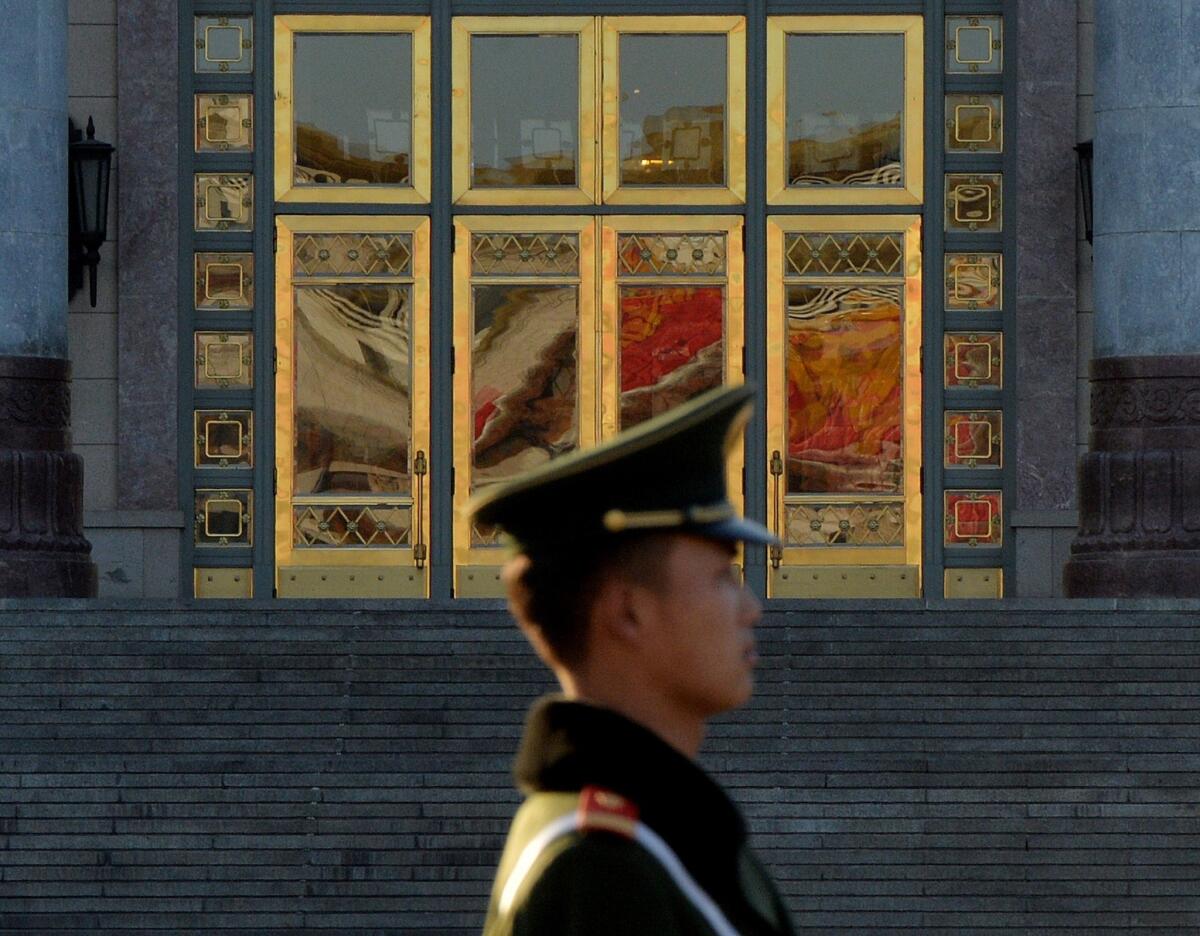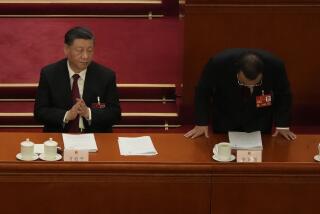Markets, analysts disappointed by results of China plenum

BEIJING -- Financial markets, economists and even one amateur limerick writer gave the thumbs down to the new Chinese Communist Party leadership’s long-awaited platform on economic reform.
Although a communiqu√© issued Tuesday night at the close of the four-day party plenum hailed the ‚Äúdecisive‚ÄĚ role played by markets, the financial markets didn‚Äôt return the compliment.
From Hong Kong to Shanghai to Seoul, Asia benchmark indexes slumped on disappointment that the plenum had failed to live up to its advance billing of ushering in market-oriented reforms. The Shanghai composite index closed Wednesday down 1.8%, while Hong Kong’s Hang Seng index fell 1.9%.
Conspicuously missing was any hint that the government would weaken the behemoth state-owned enterprises that dominate in the economy, a reform broadly hinted at in the state media in advance.
To the contrary, the five-page communiqu√© called for China to ‚Äúpersist in the dominant role of public ownership system ‚Ķ and incessantly strengthen the vitality and influence of the state-owned economy.‚ÄĚ
‚ÄúPeople were disappointed after so much anticipation,‚ÄĚ said Wang Tao, chief China economist at UBS Securities in Shanghai. ‚ÄúThe document was also vague with a lack of detail.‚ÄĚ
The communiqu√© did call for economic reforms and modernization of the government structures, but in party-speak rhetoric. For example: ‚ÄúThe plenum stressed that to comprehensively deepen reform, we must hold high the magnificent banner of socialism with Chinese characteristic.‚ÄĚ
The document was also silent on financial reforms after much anticipation that the Communist Party might call for higher interest rates and a stronger currency ‚ÄĒ measures that economists believe would benefit middle- and working-class Chinese.
One prominent Chinese legal scholar, Donald Clarke, at George Washington University Law School, even penned a limerick that he published Wednesday on his blog to express his disappointment:
One might ask of the Party’s Third Plenum...
All these slogans ‚ÄĒ
Do you really mean ‚Äėem?
We waited, all eager,
But their substance is meager,
And it‚Äôs not the first time that we‚Äôve seen ‚Äėem.
If any concrete steps came out of the plenum, they were measures to enhance the power of Xi Jinping, China‚Äôs president since March and general secretary of the Communist Party since last year. The plenum set up a National Security Council ‚ÄĒ somewhat patterned after the U.S. model ‚ÄĒ with Xi at its helm, which would oversee the various security apparatuses. Xi also heads a ‚Äúleading group‚ÄĚ on economic reform.
‚ÄúXi Jinping is really a power-hungry politician,‚ÄĚ said Willy Lam, a Hong Kong-based political analyst. ‚ÄúThere is a contradiction in terms here. The document talked about reforms, but everything is supposed to be implemented by a powerful central authority.‚ÄĚ
What made the results more puzzling was that the state media had been hyping the plenum for days, even comparing it to a landmark 1978 gathering at which then-leader Deng Xiaoping launched China’s reform and greater opening to the outside world. In meetings this month, Xi and Premier Li Keqiang privately told visiting delegations to expect dramatic reforms out of the plenum.
Gary Liu, an economist with the Chinese Europe International Business School in Shanghai, said Xi might have encountered resistance from members of the party’s central committee who are tied to the state-owned enterprises.
‚ÄúThese state-owned enterprises have become tools for government officials, their friends and families to make money,‚ÄĚ Liu said. ‚ÄúThat makes it difficult to reform them, even though most people understand that their monopoly is a big obstacle to innovation and fair competition within the Chinese economy.‚ÄĚ
Economists gleaned a few positive signs out of the plenum. The communiqu√© referred to endowing ‚Äúfarmers with more property rights‚ÄĚ ‚ÄĒ a hint that the Communist Party might embrace long-overdue land reform that would bring up living standards of rural Chinese.
Arthur Kroeber, founding partner of the Beijing-based research firm GK Dragonomics, suggested that the Chinese leadership might be planning in the coming weeks or months reforms that are ‚Äútoo capitalist to bear mentioning in such an ideological document.‚ÄĚ
‚ÄúJust because something is not in this communiqu√©, doesn‚Äôt mean that it is not happening,‚ÄĚ Kroeber wrote in a memo on the plenum.
[For the record, 7:28 p.m. Nov. 13: An earlier version of this post inadvertantly dropped the first line of Donald Clarke’s limerick.]
ALSO:
Palestinian accused of stabbing napping Israeli soldier to death
6 of 14 new states on U.N. Human Rights Council called abusers
U.N. denounces mortar attacks on schools in the Syrian capital
Twitter: @BarbaraDemick
More to Read
Sign up for Essential California
The most important California stories and recommendations in your inbox every morning.
You may occasionally receive promotional content from the Los Angeles Times.










